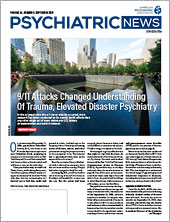Collective trauma occurs when a large number of people share the experience of being traumatized by a common source. This occurred as a result of 9/11 and 20 years later is occurring again as a result of the upending COVID-19 pandemic. At both times, our social consciousness has been collectively traumatized. These events represent cultural upheavals that disrupt individual needs for security and stability. Individual human beings rely on social bonding, attachment, and empathy. And since social factors can have an influence on the incidence of psychiatric disorders, it is clear that we humans are experiencing collective trauma in these uncertain times.
Thinking back on the past two years, when the entire world experienced a collective trauma of the pandemic, I am left wondering what will be the long-term effects of this collective experience? And what will people remember in another 20 years?
Just as the traumatic memory of 9/11 persists, so too will that of COVID-19 remain a part of our collective memory that no one will forget. Moreover, such collective trauma can take on cultural meaning as it is transmitted from one generation to another. For example, survivors of genocides who were collectively traumatized have transmitted fears of persecution to their living offspring. Furthermore, Black and Indigenous Americans continue to be racially traumatized not only by transmission but also by currently lived experience. Thus, current collective trauma can be compounded by the tragic experiences of a group’s forebears.
The impact of these collective traumatic experiences, both transmitted and lived, can be devastating. Witness the concept of Deaths of Despair and the Future of Capitalism by Angus Deaton and Ann Case. They have pointed out that less educated Americans in the age range of 45 to 54 were more prone to accidental overdose, suicide, and addiction than their college-educated counterparts and attributed this to their disparate economic circumstances in a capitalistic era.
Masks and vaccinations have highlighted domestic internal sociopolitical issues as well as public health consequences. While communities of color have been more greatly impacted with higher rates of illness and death, they have also had lower vaccination rates, continued decreased access to health care, and increased rates of psychiatric illness. According to the Center for Economic and Policy Research, workers in frontline industries are disproportionately women, and people of color are overrepresented in these industries.
Such collective traumatic events have brought the domain of mental health to the forefront of social awareness. At this moment, the field of psychiatry is poised to turn toward a renewed commitment to community psychiatry, addressing the social determinants of mental health to improve patient care, and public health initiatives focused on prevention. Psychiatrists can now use a social paradigm to ask patients: “What have you learned to expect from life?” and “What has been your lived experience?” Such an approach may permit psychiatry to mitigate the effects of traumatic experiences that result in mental illness. A basic common theme is empathy for each other, a critical human characteristic that society is at risk of losing.
Accordingly, APA will hold the Mental Health Services Conference virtually on October 14 and 15 (
Psychiatric News). The theme of the conference is “Sociopolitical Determinants: Practice, Policy, and Implementation.” Factors such as climate change, structural issues, racial trauma, and criminal justice reform will be addressed. This conference will provide an experience for psychiatrists and mental health clinicians to connect and examine complex issues impacting patient care using a multisystem lens. Creative new tools and practical strategies to intervene on behalf of patients and their families will be emphasized. We are so pleased that the new acting assistant secretary for mental health and substance use and the administrator of the Substance Abuse and Mental Health Services Administration, Miriam Delphin-Rottman, Ph.D., will present the opening plenary address.
After 9/11, communities organized around fighting a common enemy, a much-needed antidote to the fear of further attack. At times like this, working together as psychiatrists to mitigate the effects of trauma is just as critical. As Margaret Mead said, “Never doubt that a small group of thoughtful, committed citizens can change the world.” So, please register for this conference now at
psychiatry.org/mhsc! ■

